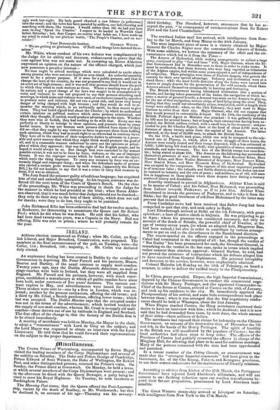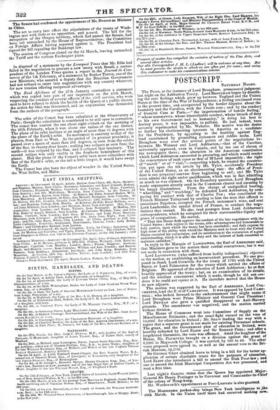_Miscellaneous.
The Crown Prince of Wurtemberg, accompanied by Baron Hugel, visited the leading members of the Corps Diplomatique and several of the nobility on Saturday. The Duke and Prince George of Cambridge, Prince Edward of Saxe Weimar, the Duke of Wellington, Sir Robert Peel, and other distinguished persons, returned the Prince's visits. On Sunday, the Prince dined at Greenwich. On Monday, he held a levee, at which several members of the Corps Diplomatique were present ; and in the afternoon he dined with the Queen Dowager, a party being in- vited to meet his Royal Highness. On Tuesday, he took luncheon at Buckingham Palace.
The Morning Post states, that the Queen offered the Poet-Laureate- ship, vacant by the death of Southey, to Mr. Wordsworth ; but that he declined it, on account of his age—Thursday was his seventy-
third birthday. The Standard, however, announces that he has ac- cepted the post, "in consequence of communications from Sir Robert Peel and the Lord Chamberlain."
The overland Indian mail has arrived, with intelligence from Bom- bay to the 1st March, and from Macao to the 20th January.
The most important piece of news is a victory obtained by Major- General Sir Charles Napier over the contumacious Ameers of Scinde. With some addition, we borrow the summary of the affair and the cir- cumstances which led to it from the Times—
The Ameers of Hyderabad, while making arrangements to collect a large army, couftpued to play "fast and loose " with Major Outram, whom the In- dian Government bad in December sent to them in order to make terms. It must be recollected, that those Ameers, who were long regarded as tributaries of the Afghan empire, had within some years enjoyed a sort of independence of all subjection. Their principles were those of Eastern despots, who govern the country for their own special advantage. Industry and civilization were at a stand there ; whits the most fertile districts along the Indus were turned into wastes or jungle deserts for the preservation of the wild animals, whom those Ameers amused themselves occasionally in hunting and destroying.
The British Government having introduced civilization into a portion of Scinde, and having taken possession of the Indus, the navigation of which be- came a matter of general benefit, a demand was made on the Ameers to give up, for the use of that navigation, certain strips of land lying along the river. They, feeling that they could not immediately refuse, temporized, until at length their troops were collected ; when, on the 14th February, they sent word to Major Outram to retire from their city. Major Outram, who did not suppose that they would proceed to extremities, delayed. On the 15th, the residency of the British Political Agent or Minister was attacked: it was gallantly defended by 100 men for several hours; but at length, their ammunition having been ex- pended, the British soldiers retired, with a small loss, to the steamers ; and pro- ceeded to join Sir Charles Napier, then at the head of about 2,700 men, at a distance of about twenty miles from the capital of the Ameers. The latter hastened, at the head of 22,000 men, to attack the British force.
On the 17th, a battle took place, which can only be compared to the cele- brated one at Plessey, in which, after a severe struggle of three hours, the Ameers were totally routed and their troops dispersed, with a loss estimated at 5,000; 1,000 being left dead on the field ; with quantities of stores, ammunition, standards, and some treasure. The loss of the British troops was considera- ble ; being stated at about 250. The A meers on the following day surrendered themselves prisoners of war; their names being Meer Roostom Khan, Meer
'
Nusseer Khan, and Meer Wullee Mahomed of Khyrpore, Meer Nusseer Khan, Meer Shaded Khan, and Meer Iloossein Khan of Ilyderabad. Hyderabad was occupied by the conquerors. The capture of this moat important position is of immense value ; the valuable and fertile districts along the Indus can now be restored to industry and the arts of peace ; and millions, as of old, will soon live in happiness in those plains where those despots have during a century scattered misery and desolation.
Anarchy continued to prevail in Afghanistan. Akhbar Khan is said to be master of Cobol ; and his father, Dost Mahomed, was proceeding from Lahore towards Peshawar, as if to join him. Akhbar Khan threatened to invade the province of Peshawar, and to take it from the Sikhs ; but the good treatment of old Dost Mahommed by the latter may prevent that invasion.
From Candahar news bad been received that Softer Jung had been compelled to quit that city, and seek safety in flight. Lord Ellenborough arrived at Delhi on the 5th February, with great splendour ; a host of native chiefs in histrain. He was preparing to go to Agra ; where his presence was considered necessary, not only on account of the death of Scindia, the powerful chief of Gwalior, at the age of twenty-seven years, (to whom an adopted heir, Bbageerut Rao, had been named,) but also in order to contribute by various arrange- ments to put an end to the disturbances in the Bundelcund districts.
The courts-martial on the officers engaged in the proceedings at Cabal had terminated in the acquittal of all : but, though the verdict of " Not Guilty" has been pronounced for each, the Governor-General, in remarking on the verdict in the last case, spoke in terms which implied rather consent than absolute approval : General Shelton, be said, had not proved the existence of instructions which his defence alleged him to have received from General Elphinstoue. His personal intrepidity and devotion to the service, however, were emphatically admitted.
Colonel Malcolm left Bombay on the 18th of February, on board a steamer, in order to deliver the ratified treaty to the Plenipotentiary.
In China, peace prevailed. Elepoo, the high Imperial Commissioner, deputed by the Chinese Government to conduct the commercial nego- tiations with Sir Henry Pottinger, and also appointed Commander-ut- Chief of the forces at Canton, arrived at Canton on the 10th of January, and took up his residence in the city. He immediately apprized the Plenipotentiary of his arrival, and some little correspondence took place between them ; when it was arranged that the first negotiatory confer- ences should be held at Whampoa, about the 21st January. When Elepoo reached Canton, the Hong merchants expressed their desire to have an interview with him ; which he declined; and it is now said that he had demanded from them, by neat June, the whole amount of their debts—three millions of dollars.
The merchants had reposed their claims for indemnity on the Chinese Government, on account of the destructive riots of December the 7th and 8th, in the hands of Sir Henry Pottinger. The spirit of hostility to the British was still manifested by the populace of Canton ; but the local authorities bad taken steps to keep order. The officers of the Province of Canton had publicly censured the officers in charge of the Minglum Hall, for allowing that place to be used for seditious meetings. Many of the persons connected with the riots had been apprehended and punished.
In a recent number of the Peking Gazelle, an announcement was made that the "strongest Imperial commands" had been given to the Governors, Sec. of the Che Keang, Fukeen, and Keangnau provinces, to use their utmost endeavours for the maintenance of friendly relations.
According to advices from Lisbon of the 27th March, the Portuguese Government have rejected Lord Aberdeen's ultimatum, and will not consent to ant farthing reduction upon our woollen manufactures be- yond their former proposition, pronounced by Lord Aberdeen inad- missible.
The Great Western steam-ship arrived at Liverpool on Saturday, with intelligence from New York to the 17th March.
The Senate had confirmed the appointment of Mr. Rverettas Minister att China.
The act to carry into effect the stipulations of the treaty of Wash- ington met with little or no opposition, and passed. The bill for the occupation of the Oregon territory, which had passed the Senate, had been left untouched by the House of Representatives; the Committee on Foreign Affairs having reported against it. The President had signed the bill repealing the Bankrupt law. The session of Congress closed on the 3d March, leaving untouched the Tariff and the various Exchequer plans.
In disproof of a statement by the Liverpool Times that Mr. Ellis had failed in the negotiation to procure a new treaty with Brazil, a corres- pondent of the London Times quotes a report in the Journal do Com- mercio of the 7th February, of a statement by Senhor Torres, one of the new Ministers, who assured a deputy that the Brazilian Government had not refused to enter into negotiations with any country whatever, for new treaties offering reciprocal advantages.
The Zuid Afrikaan of the 27th January. contradicts a statement which was copied into part of our impression on the 25th March, respecting the conduct of several officers of the civil service, who were said to have refused to drink the health of the Queen at a public dinner. An action for libel was threatened, and an explanation was demanded from the authors of the paragraph.
The orbit of the Comet has been calculated at the Observatory of Paris ; though the calculation is considered to be still open to correction. The comet was nearest the sun about eight o'clock on the morning of the 28th February, when it was about one radius of the sun distant. The plane of its orbit inclines at an angle of more than 31 degrees with the plane of the Earth's orbit. Its movement is contrary to that of the planets, from East to West. At the period of its greatest proximity, it passed over a space of more than 292 degrees, as seen from the centre of the Sun, in twenty-four hours ; making two eclipses as seen from the earth—it was eclipsed by the Sun, and it eclipsed that luminary. The second eclipse was only visible in the Southern hemisphere of this planet. Had the plane of the Comet's orbit been more coincident with that of the Earth's orbit, or the tail a little longer, it would have swept the Earth.
The Comet has also been the object of wonder in the United States, the West Indies, and Malta.



























 Previous page
Previous page